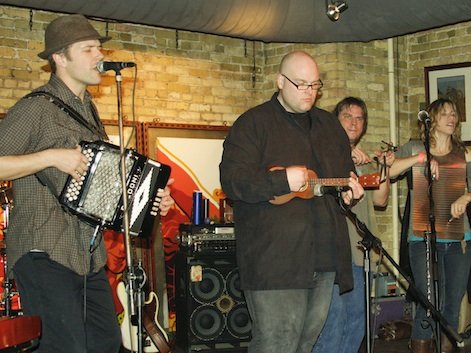And the WAMI goes to ... polka?
Yup, the WAMI Awards -- the Wisconsin version of the Grammys -- will recognize the state's best polka artist at its annual awards ceremony next month in Appleton.
Last summer, the National Academy of Recording Arts and Sciences dropped the Grammy award for Best Polka Album. The group made the decision in order to "ensure the awards process remains representative of the current musical landscape."
Wisconsin Area Music Industry President Lance Shellman says the addition reflects the state's rich polka heritage. In fact, it's the official state dance.
"There's a big polka legacy in Wisconsin," Shellman says. "Growing up, there was a polka band playing every weekend someplace."
At first mention, polka conjures up images of plumb men in lederhosen, playing tubas and accordions. Certainly, there is an ethnic element to the genre, but it goes way beyond cultural stereotypes.
"Polka music here is much like Zydeco is in Louisiana," Shellman says. "It's a very upbeat music with a rich history, especially here."
In Milwaukee, legends like Vern and Steve Meisner have been among the more recognizable names in the local polka scene. Others, like Jimmy Sturr -- an 18-time Grammy winner -- Louie Bashell and the late Frankie Yankovic -- have been popular draws across the Midwest and are also known nationally.
Those artists mastered the "American" version -- a style which includes banjos and has more of a folksy, almost country feel.
Today, "younger generation" groups like Oshkosh's Copper Box, are taking the genre a littler further -- and are one of this year's nominees, along with the Jerry Schneider Band, Steve Meisner and the Happy Schnapps Combo.
"They're the next generation," Shellman says.
Dan Jerabek and his wife, Michelle, founded the four-person group in 2002. They both grew up around polka music -- Dan's father is the well-known performer "Tuba Dan" Jerabek and Michelle grew up playing with her family's group, The Goodtime Dutchmen.
For Dan, the music has been a part of his life since he first played the drums with his father at age eight -- and earned $20 for the gig. For WAMI to recognize the genre is special to him.
"I was happy -- and a little surprised -- when I heard the news," Jerabek says. "Polka has meant a lot to me throughout my life; from playing with my dad and meeting my wife and starting a family."
Jerabek dismisses the notion that polka is simply three notes, over and over.
"It's challenging music," Jerabek says. "To play it correctly, it calls for a lot of energy; it's the kind of music that's happy."
Prior to Copper Box, the Jerabeks played in Kick, an all-polka band. The current group covers a wide range of music, with polka undertones on Jerabek's button box and Michelle's saxaphone (along with drummer Jason Van Ryzin and bassist Kevin Junemann) supporting blues, rock, zydeco, country and even jazz.
"I like the ability to mix polka with rock and jazz," Jerabek says. "I see it all the time when we play dances or festivals; we'll play a couple of rock or zydeco tunes and then throw in a polka. We'll just let it rip and next thing you know, people are bouncing around.
"A lot of times, they don't even realize that they're dancing to a polka ... that's pretty powerful music."
In addition to the polka nomination, Copper Box also was nominated for best Americana Artist of the Year and Jerabek earned a nomination for specialty instrumentalist.
Polka may not crack the billboard Top 40 anytime soon but, especially in Wisconsin and the Upper Midwest, the music isn't hard to find.
Polka music is still a regular staple at church festivals, VFW posts and other local gatherings. Milwaukee's large German and Polish communities feature a number of regular events, but even still, that music is more ethnically-based and, despite a growing abundance of youth groups, skews towards an older audience.
Polka does, however, take the stage regularly at Kochanski's Concertina Beer Hall, 1920 S. 37th St. Owner Andy Kochanski is a fan of many different music genres, but has a soft spot for the music his parents listened to while he was growing up.
Kochanski is happy about the decision to add polka to the WAMIs, if only so it introduces a new generation of listeners to the classic genre.
His bar, a legendary venue for polka music, still has regular polka nights which draw customers -- and dancers -- of all ages.
"Especially with the Grammys dropping polka, this is a good thing," Kochanski says. "It's not so much that younger people don't like it, a lot of them haven't really been exposed to it or introduced to it."
Shellman isn't predicting a polka comeback -- not that it ever really went away -- but does think that, by WAMI recognizing the genre, it might gain a breath of fresh air and perhaps enjoy a little resurgence in popularity.
"Sometimes it works that way," Shellman says. "It's a lot like blues music, which in the '70s, saw a bit of a down time. But then, artists like Stevie Ray Vaughan came along, rejuvenated it and then blues found a younger audience.
"Polka is a niche, but it's still a popular music."






